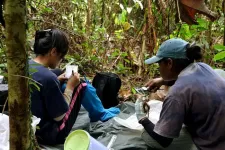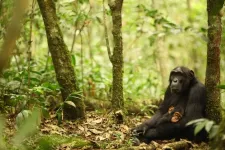(Press-News.org) UNIVERSITY PARK, Pa. — Antibiotic-resistant Salmonella is a serious public health concern that has increased in recent years as the bacteria have developed ways to survive drugs. According to the U.S. Centers for Disease Control and Prevention, people can get Salmonella from eating contaminated food products or from infected people or animals — typically via unintentional contact with feces via touching hands or stroking a pet. However, a team of Penn State researchers have found that household dogs are an overlooked transmission point for zoonotic pathogens such as nontyphoidal Salmonella, which can cause diarrhea, fever and abdominal cramps, with some infections potentially having life-threatening complications.
The findings were made available online ahead of the next print edition of the journal Zoonoses and Public Health. Given the proximity of dogs to humans and the use of critically important antibiotics in companion animal medicine, the researchers reported, household dogs represent a risk for the spread of antimicrobial-resistant Salmonella. They explained that better awareness of the risk and proper hygiene could potentially help mitigate cross-species infections.
Salmonella infections in dogs can be clinical — showing signs or symptoms — or asymptomatic with numerous studies reporting Salmonella isolation from clinically healthy dogs, according to team leader Erika Ganda, assistant professor of food animal microbiomes, Penn State College of Agricultural Sciences. A major concern, she explained, is the closeness of humans and pet dogs that creates ample opportunity for Salmonella “zoonosis” — the disease transmitted to humans from animals — and pet-management decisions involving food contamination, improper food handling or both can increase the likelihood of infection.
To investigate antimicrobial-resistant Salmonella and the zoonotic potential of nontyphoidal Salmonella isolated from dogs and humans, the researchers leveraged existing biosurveillance infrastructure. Using the U.S. Food & Drug Administration’s Veterinary Laboratory Investigation and Response Network, they identified all nontyphoidal Salmonella strains isolated from domestic dogs between May 2017 and March 2023.
Then they matched the timing and location of those 87 cases to strains isolated from humans in the National Center for Biotechnology Information database maintained by the National Library of Medicine at the National Institutes of Health, which provides access to biomedical and genomic information. They found 77 suspected zoonotic cases — meaning the bacteria moved from a pet dog to a human — comprising 164 strains, collected from 17 states in the United States.
Strains isolated from dogs included diverse serovars, or distinct variations within the species of bacteria, with most being clinically relevant to human health, the researchers reported. While the datasets did not contain information on severity of infection or treatments, the researchers did find that all identified strains possessed antimicrobial resistance genes for drug classes deemed critically or highly important by the World Health Organization.
“We identified 16 nontyphoidal Salmonella isolates from humans closely related to more than one of six dog-associated strains,” said Sophia Kenney, a student in the molecular, cellular and integrative biosciences doctoral program, and in the Department of Animal Science, who spearheaded the study. “Collectively, our data emphasize the importance of antimicrobial stewardship and sustained biosurveillance beyond human and agriculture-associated veterinary medicine, using a ‘One Health’ framework, that accounts for all transmission points — including companion animals. One Health isan approach that recognizes that the health of people is closely connected to the health of animals and our shared environment.”
Antimicrobial stewardship in companion animal veterinary medicine is crucial for mitigating antimicrobial resistance within the One Health model, Kenney explained.
“Especially with Salmonella, we think about the role of agriculture and transmission — we think about eggs, we think about beef. But the thing is, we don't let cows sleep in our beds or lick our faces, but we do dogs,” she said. “We have this close bond with companion animals in general, and we have a really close interface with dogs. So, we asked the question: What's the role of companion animals in transmission of zoonotic disease like Salmonella, since they can get it. Salmonella infections in dogs are not common but we’re aware of foodborne outbreaks related to pet treats or from contact with contaminated pet food and improper food handling.”
Study co-author Nkuchia M’ikanatha, lead epidemiologist for the Pennsylvania Department of Health and an affiliated researcher in Penn State’s Department of Food Science, referred to an outbreak of multidrug-resistant Salmonella infections in people linked to pig ear pet treats in the United States a few years ago that sickened 154 people across 34 states.
“This reminds us that simple hygiene practices such as hand washing are needed to protect both our furry friends and ourselves — our dogs are family but even the healthiest pup can carry Salmonella,” he said. "Salmonella is a quintessential human microbe, its presence intertwined with our history since the dawn of agriculture. Emerging research suggests this pathogen may have shadowed humanity for some 10,000 years, coinciding with the rise of animal domestication. With nearly 40% of Pennsylvania households and over half of U.S. homes including dogs, we must respect the enduring threat of Salmonella and remain vigilant in preventing its spread within our families."
Bacteria are never entirely "bad" or "good" — their role depends on the context, Ganda pointed out. While some bacteria, like Salmonella, can pose serious health risks, others are essential for maintaining our health and the health of our pets. It is important to remain vigilant and informed about potential risks, especially when living closely with animals, she added.
“At the same time, several studies highlight the significant physical and mental health benefits of owning a dog, including reduced stress and increased physical activity,” Ganda said. “Our goal is not to discourage pet ownership but to ensure that people are aware of potential risks and take simple steps, like practicing good hygiene, to keep both their families and their furry companions safe.”
This work was supported by funds from the U.S. Department of Agriculture, the U.S. Centers for Disease Control and Prevention, the National Institutes of Health and the U.S. Food and Drug Administration.
END
Pet dogs often overlooked as spreader of antimicrobial-resistant Salmonella
Proper hygiene may help mitigate infections, researchers say
2025-01-09
ELSE PRESS RELEASES FROM THIS DATE:
Pioneering new tool will spur advances in catalysis
2025-01-09
For decades, catalysts have been unsung heroes in daily life. These workhorses transform a starting material into a product or fuel with lower energy, like the yeast in bread making and human-made catalysts for converting raw materials into fuels more efficiently and sustainably. A promising class of these helpful substances, called single atom catalysts, has emerged, and researchers need new methods to better understand them. More specifically, they want to know how the structure of the sites where chemical reactions occur, called active sites, affects the catalyst’s ability to speed up the chemical reaction rate, known as the activity.
In an important step forward, researchers ...
Physical neglect as damaging to children’s social development as abuse
2025-01-09
CHAMPAIGN, Ill. — While physical neglect is understudied compared to physical, sexual or emotional abuse, neglect is just as damaging to children’s social development, a new study indicates.
More than 9,150 individuals, nearly 41% of whom retrospectively reported some form of maltreatment before age 12 or reaching the sixth grade, were included in the study, published in the journal Child Abuse and Neglect. The project explored the impact of abuse or neglect on three dimensions of children’s structural peer relationships — whether maltreated youth were less social/more withdrawn, less popular with or avoided by their peers and how ...
Earth scientist awarded National Medal of Science, highest honor US bestows on scientists
2025-01-09
UNIVERSITY PARK, Pa. — Richard Alley, Evan Pugh University Professor of Geosciences at Penn State, was awarded the National Medal of Science at a White House ceremony on Jan. 3.
Alley was one of 23 individuals and two organizations awarded the 2025 National Medals of Science and National Medals of Technology and Innovation, the nation’s highest honors for achievement and leadership in science and technology.
“Dr. Alley is deeply deserving of this most prestigious honor, and it is heartening to know that our nation sees in him what the Penn State community has known for decades,” said Penn State President Neeli Bendapudi. “Dr. ...
Research Spotlight: Lipid nanoparticle therapy developed to stop tumor growth and restore tumor suppression
2025-01-09
Yang Zhang, PhD, and Jinjun Shi, PhD, both of the Center for Nanomedicine and Department of Anesthesiology, Perioperative and Pain Medicine at Brigham and Women’s Hospital, are co-senior authors of a paper published in ACS Nanoscience Au, “Lipid Nanoparticle Delivery of mRNA and siRNA for Concurrent Restoration of Tumor Suppressor and Inhibition of Tumorigenic Driver in Prostate Cancer.”
How would you summarize your study for a lay audience?
Most cancers occur when there is an imbalance of cellular growth and inhibition, causing cells to grow rapidly and form tumors in the body. For example, ...
Don’t write off logged tropical forests – converting to oil palm plantations has even wider effects on ecosystems
2025-01-09
A research team led by the University of Oxford has carried out the most comprehensive assessment to date of how logging and conversion to oil palm plantations affect tropical forest ecosystems. The results demonstrate that logging and conversion have significantly different and cumulative environmental impacts. The results have been published today (10 January) in Science.
Understanding how different aspects of tropical forests are affected by logging and conversion to oil palm plantations is important for identifying priority habitats for conservation and restoration. It can also help aid decisions on land use – for instance, whether a logged forest should be ...
Chimpanzees are genetically adapted to local habitats and infections such as malaria
2025-01-09
Chimpanzees bear genetic adaptations that help them thrive in their different forest and savannah habitats, some of which may protect against malaria, according to a study by an international team led by UCL researchers.
Chimpanzees are our closest living relatives, sharing over 98% of their DNA with humans, and the scientists say that their findings, published in Science, can not only teach us about our own evolutionary history, but also about the biology of malaria infection in humans.
Chimpanzees are endangered ...
Changes to building materials could store carbon dioxide for decades
2025-01-09
Replacing conventional building materials with materials modified to store carbon dioxide could move the planet closer to net-zero greenhouse gas emissions, according to a new study by Elisabeth Van Roijen and colleagues. The researchers calculate that full replacement of conventional building materials with these CO2-sequestering alternatives could store as much as 16.6 ± 2.8 gigatons of CO2 each year – an equivalent to about 50% of the anthropogenic CO2 emissions in 2021. Removing carbon dioxide from the atmosphere, along with decreasing emissions, is important for slowing ...
EPA finalized rule on greenhouse gas emissions by power plants could reduce emissions with limited costs
2025-01-09
In this Policy Forum, John Bistline and colleagues analyze the potential impacts of the U.S. Environmental Protection Agency’s finalized power plant rules regarding greenhouse gas emissions. Using nine models of the U.S. electric sector and energy systems, the researchers found that the rules would speed up the reduction of emissions in the power sector. Under the rules, the levels of carbon dioxide emitted by the sector would be 61%-81% below 2005 levels by 2040. Under current policies, emission levels would be 51% to 83% below 2005 levels by 2040, ...
Kangaroos kept a broad diet through late Pleistocene climate changes
2025-01-09
Samuel Arman and colleagues’ close examination of tooth microwear among living and extinct kangaroo species suggests that most of the species living in Australia during the Late Pleistocene had a broad, generalist diet rather than being specialized grazers. This broad diet likely allowed them to survive the glacial-interglacial cycles that drove fluctuations in vegetation on the continent. The findings add more evidence to the idea that human hunting, rather than failure to adapt to climate changes, ...
Sex-specific neural circuits underlie shifting social preferences for male or female interaction among mice
2025-01-09
Male and female mice both prefer social interaction with female mice under normal conditions, but both switch to preferring males when their survival is threatened, according to a new study by Anqi Wei and colleagues. These preferences are mediated by different neuronal circuitry in male and female mice related to dopaminergic neurons in the brain’s ventral tegmental area, the researchers found. The findings offer a clearer picture of the underlying biology of socio-sexual preferences. These preferences are essential for successful reproduction, ...
LAST 30 PRESS RELEASES:
New ‘scimitar-crested’ Spinosaurus species discovered in the central Sahara
“Cyborg” pancreatic organoids can monitor the maturation of islet cells
Technique to extract concepts from AI models can help steer and monitor model outputs
Study clarifies the cancer genome in domestic cats
Crested Spinosaurus fossil was aquatic, but lived 1,000 kilometers from the Tethys Sea
MULTI-evolve: Rapid evolution of complex multi-mutant proteins
A new method to steer AI output uncovers vulnerabilities and potential improvements
Why some objects in space look like snowmen
Flickering glacial climate may have shaped early human evolution
First AHA/ACC acute pulmonary embolism guideline: prompt diagnosis and treatment are key
Could “cyborg” transplants replace pancreatic tissue damaged by diabetes?
Hearing a molecule’s solo performance
Justice after trauma? Race, red tape keep sexual assault victims from compensation
Columbia researchers awarded ARPA-H funding to speed diagnosis of lymphatic disorders
James R. Downing, MD, to step down as president and CEO of St. Jude Children’s Research Hospital in late 2026
A remote-controlled CAR-T for safer immunotherapy
UT College of Veterinary Medicine dean elected Fellow of the American Academy of Microbiology
AERA selects 34 exemplary scholars as 2026 Fellows
Similar kinases play distinct roles in the brain
New research takes first step toward advance warnings of space weather
Scientists unlock a massive new ‘color palette’ for biomedical research by synthesizing non-natural amino acids
Brain cells drive endurance gains after exercise
Same-day hospital discharge is safe in selected patients after TAVI
Why do people living at high altitudes have better glucose control? The answer was in plain sight
Red blood cells soak up sugar at high altitude, protecting against diabetes
A new electrolyte points to stronger, safer batteries
Environment: Atmospheric pollution directly linked to rocket re-entry
Targeted radiation therapy improves quality of life outcomes for patients with multiple brain metastases
Cardiovascular events in women with prior cervical high-grade squamous intraepithelial lesion
Transplantation and employment earnings in kidney transplant recipients
[Press-News.org] Pet dogs often overlooked as spreader of antimicrobial-resistant SalmonellaProper hygiene may help mitigate infections, researchers say




